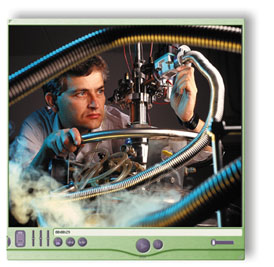Are you a journalist? Please sign up here for our press releases
Subscribe to our monthly newsletter:

When penetrated by magnetic fields, superconductors acquire "super memories": Electric currents flowing through them in this state are long remembered. Weizmann Institute scientists have now shown how these currents leave their lasting signature.
Unique in their capacity to conduct electricity without resistance, superconductors could one day bring a wealth of good tidings: the ability to carry electric currents across vast distances, for instance, and a wide variety of industrial and transportation technologies. A considerable number of these innovations are based on controlled exposure of superconductors to magnetic fields, and the manner in which these fields penetrate the superconductors.
Magnetic fields infiltrate some of the superconductors in the form of tiny whirlpools, each containing a weak magnetic flux at its core. Under optimal conditions, these whirlpools settle at equal distances from each other, in a fashion similar to the arrangement of molecules within a solid crystal.
However, Prof. Eli Zeldov of the Weizmann Institute's Condensed Matter Physics Department proved in the past that under certain conditions this "crystal" may undergo a "meltdown" so that the whirlpools are transformed to a disorganized state resembling the material's liquid structure. An electric current passing through a superconductor may affect the motion of the magnetic whirlpools, impairing conductivity.
In a paper recently published in Nature, Zeldov, research student Yosef Paltiel, and colleagues, including Drs. Yuri Myasoedov and Hadas Shtrikman, explain how these "whirlpools" enable the superconductor to "remember" the properties of currents that flowed through it (for example, their strength, direction, and frequency). The scientists found that the electric current leaves its mark on the magnetic "whirlpools," forming them into lasting patterns. Essentially a story of past current events these patterns provide information regarding the physical properties of currents that had previously infiltrated the superconductors.
The enhanced understanding of superconductors generated by this research may lead to a wide spectrum of advanced technologies, including the development of novel sensors that rely on this memory effect.
Prof. Eli Zeldov holds the David and Inez Myers Professorial Chair. His research is supported by the Philip Klutznick Endowed Scientific Research Fund, and the Robert and Giampiero Alhadeff Research Award.